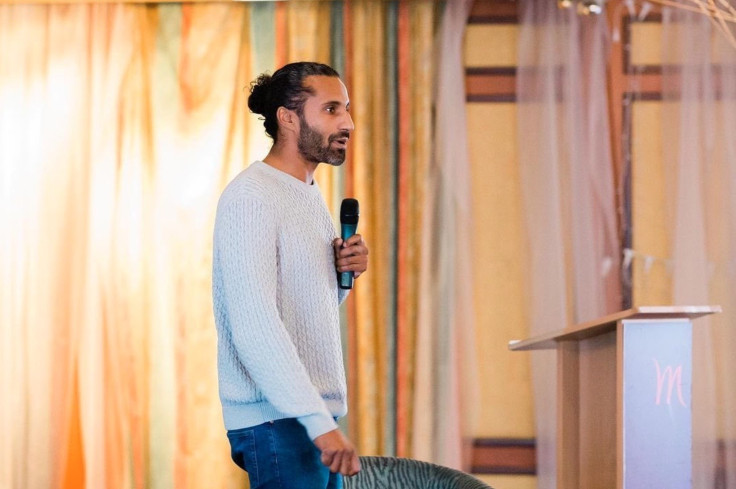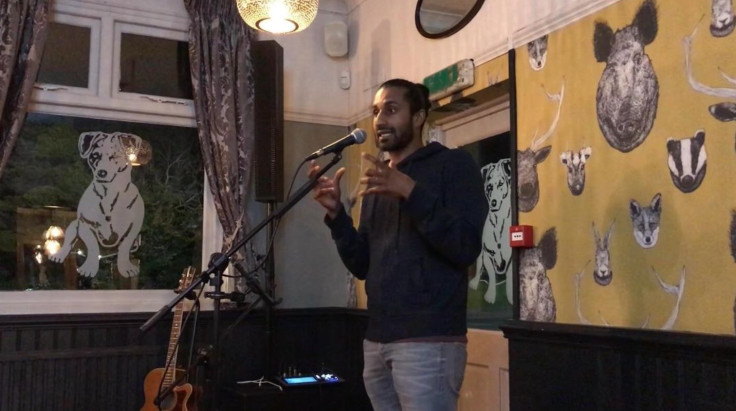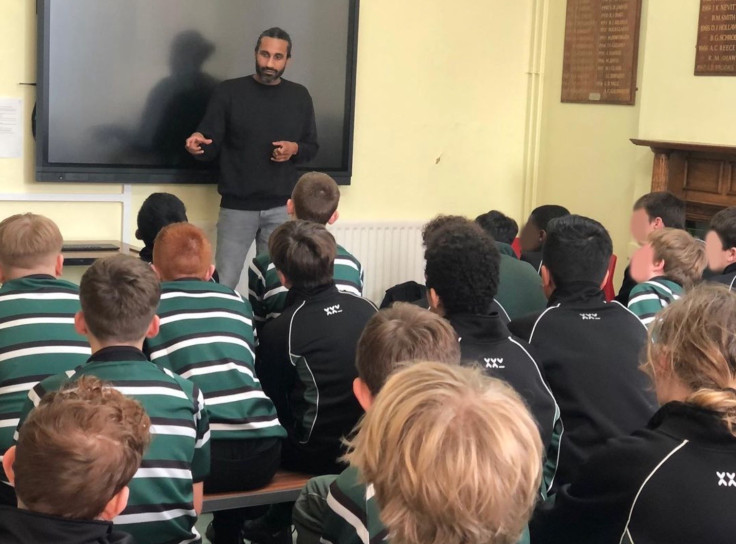Ex-McLaren Engineer Reveals Childhood Sexual Abuse To Empower Others
Jeremy Indika launched Something to Say, an advocacy against child sexual abuse

"When I turned 25, the memories of my abuse began to return," said Jeremy Indika.
While working as a Design Engineer for McClaren between 2012 and 2014, Something to Say Founder Jeremy Indika said that his career was "going well" and taking him "all over the world." That was until, at 25-years-old, the memories of his childhood traumas returned and he was forced to speak out about being a victim of child sexual abuse for the very first time.
"I was victim to child sexual abuse when I was eight years old, and it finished when I was ten years old," Indika revealed.
"I was eight years old and nowhere near puberty."
The Something to Say Founder told International Business Times UK that he was abused by a 35-year-old man.
"He was a nurse working in the local hospital and my dad was a doctor, also working in the same hospital... Even though he was 35, he was still training and would stay at our house now and again and come over now and again," he said.
Indika confirmed that the sexual abuse consisted of "kissing, cuddling, fondling, masturbation, oral sex," and went on to confess: "He had groomed me into thinking that it was something that I should do. He groomed me into thinking that this was pretty normal."
"I always thought it was a little bit weird, but it was okay for me because none of it was painful and none of it was forceful."
Although he can't remember exactly how he felt during that period of his life, the now 38-year-old acknowledged that the acts of sexual abuse were "probably really confusing for me at the time."
According to a report published by the child-protection charity National Society for the Prevention of Cruelty to Children (NSPCC), one in 20 children have been sexually abused across the UK alone.
However, more recent statistics published by the charity Rape Crisis note than one in six children have been sexually abused in England and Wales alone.
The NSPCC report also exposed the staggering number of unreported childhood abuse cases in the UK. Out of the adults who experienced sexual abuse as a child, 72% admitted that they did not tell anyone at the time of the abuse.
Throughout the 24 months that he was victim to child sexual abuse, Indika shared that "nobody knew."
"It was happening in my room, it would happen when my dad was at work and I wasn't giving anyone any indication of what was going on," he added.
"I was showing no signs whatsoever. I was doing well at school, I was confident, I was energetic, I was a bit bolshy as a young boy, [I was] playing all the sports, captaining the rugby team."
"Literally nobody had a clue about it."
It was only at 34-years-old, that Indika felt confident enough to take his case to court.
"I tried to prosecute him," the Something to Say founder explained, noting that "the police investigation lasted for one year and unfortunately it couldn't be taken forward because there wasn't enough evidence."
"Because this was a historic case, there was no evidence. There were no emails, there was no video footage, there was no forensics or anything like that," he revealed.
In the fifteen years between being sexually abused at eight years old and the traumatic memories arising at 25-years-old, Indika went on to say: "My brain had cleverly put it to the back of my mind and forgot about it."
"When I was 27, I started speaking to friends about it. Then, over the next five years, I spoke to more and more and more people... I started speaking publicly, on social media and at open mic nights in London," he said, explaining that inappropriate audience responses made him feel "crushed" at times.

While attending another open mic night in London, a member of the crowd introduced him to the poetry and spoken word scene, which ultimately propelled the Something to Say founder into a world of artists, filmmakers, illustrators photographers and people who were interested in collaborations.
Surrounded by a team of people advocating for the end of child sexual abuse, Indika launched the Something to Say platforms in 2019. In a bid to raise awareness of the long-term impact and presence of child sexual abuse, the founder went on to invite other people to share their child sexual abuse stories.
"I got so much confidence with sharing my story, that I wanted to give others a space to share as well... Anyone that wanted to submit a question, a poem or a piece of artwork, they could do that there," he said.
In less than six years, Something to Say has succeeded in sharing between 110 to 120 child sexual abuse stories.
Since launching Something to Say, Indika said that he has noticed a difference in himself.
"Every time I read a post from Something to Say, it empowers me, it makes me feel powerful, it energises me and it gives me the belief that we can do something very unique with this topic," he explained, going on to note: "When you read those stories on Something to Say, they are all about strength and courage."

Having recently launched the Something to Say YouTube account, home to videos of victims speaking out against their perpetrators and sharing their stories of child sexual abuse, the channel has already allowed parents of those who have been subject to childhood sexual torment to also speak out in videos on the platform.
"To see somebody on video actually face their trauma, actually face what they went through when they were a child and tell other people their story to help others and to empower others, it just brings a different element to it."
"It is such a frightening thing for that person to do," he added, recognising how "we very rarely see that."
Recognising that we are living in a technical era that provides people with a platform to use their voice, the Something to Say founder said that he wants to normalise victims of sexual abuse speaking out about their traumatic experiences.
"I think we are moving in the correct direction for it to be more expected for people to speak out about this," he explained.
"Hearing others share their story; it makes others feel less alone."
Since speaking out about his own experiences, the 38-year-old said that masculinity stereotypes have prevented men from sharing their stories, validating their childhood trauma and seeking justice.
"Many men are not saying anything because it could be considered as weak. They will feel like they got tricked and manipulated into doing something that is horrific, maybe even disgusting to them," he said.
To stand up and take control of your past, is "the strongest thing anyone can do", Indika added as he urged men to speak out and become "great role models to other young men and young boys in doing so."

Since launching the Something to Say platforms five years ago, Indika has delivered empowering speeches and lectures to organisations and schools.
However, "I am banging my head against the wall when it comes to schools," he said.
The 38-year-old told me that he believes the best way to inspire children to get support with being a victim of sexual abuse, is to introduce them to somebody who has first-hand experience.
But despite offering to do talks in schools for free, the Something to Say founder admitted that "most of them turn me down."
"As adults, we have a responsibility to do something with this. We have a responsibility to protect the younger generation," he said.
While there are many reasons why school's have refused to host Something to Say, Indika suggested: "It could be because they are worried about potential parent backlash... it could be because some teachers just don't want this subject in their school... it could be because they are worried about how many disclosures they may get when I leave and they don't know how to handle that."
Despite the setbacks, Indika has pledged to continue his mission - addressing the mass presence of child abuse across the globe.
"The sexual abuse, the molestation, the rape of children, it is something that nobody wants to see but nobody wants to deal with it either. I want to get this subject onto everybody's table, but in an engaging way," he explained.
The last thing that social media users want to do, is scroll through content that addresses child sexual abuse, the Something to Say founder added, because it is "too uncomfortable".
"I want to turn that on its head and make it something where people are like 'wow that is so interesting, I need to know more'. That way, we can raise the awareness with people and move into the correct direction."
© Copyright IBTimes 2025. All rights reserved.





















